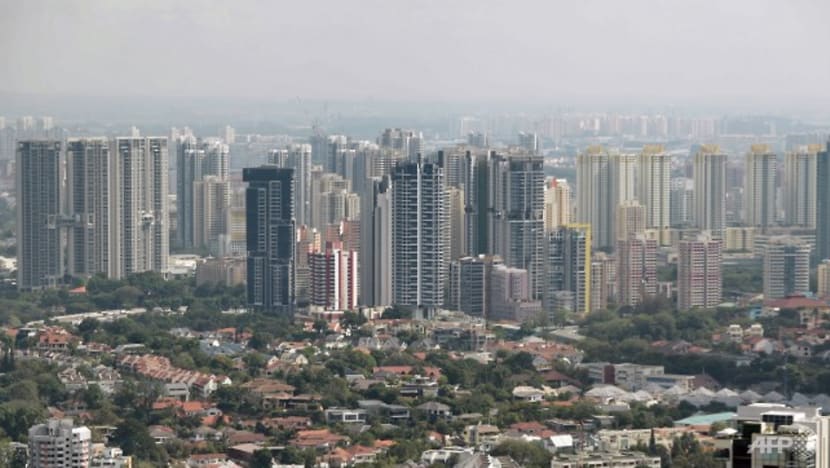No change to 3-month minimum stay duration for private residential properties: URA
The Urban Redevelopment Authority announced on Wednesday (May 8) that it would uphold the current regulations after an extensive public consultation.

A view of residential housing in Singapore. (File photo: AFP)
SINGAPORE: The Urban Redevelopment Authority (URA) said on Wednesday (May 8) that it will not proceed with proposed regulations for the use of private residential properties for short-term accommodation (STA).
This means the three-month minimum stay duration will continue to apply.
The agency made the decision after consultations with key stakeholders since 2015, including members of the public, management corporations and managing agents of condominiums and neighbourhood committees.
A national survey of more than a thousand private homeowners commissioned by the URA in the second half of 2018 found that the majority of Singaporeans supported the proposed regulatory framework for STA.
However, several home-sharing platform operators found the proposed rules to be overly restrictive and wanted a "lighter touch approach", URA said.
Those who were engaged said that they could not support the proposed regulatory framework, and in particular, they did not support the proposed threshold for owners’ consent, and the cap on permissible nights for short-term accommodation, the agency added.
Management corporations also expressed their concern about the greater responsibilities placed on them to regulate the flow of transient occupants and to possibly mitigate the effects of these occupants, the URA said.
"Given this impasse, URA will not proceed with the proposed regulations at this stage. Instead, it will continue to monitor the situation, as well as broader developments on the STA scene. URA remains open to reviewing the position in future, if and when platform operators demonstrate that they are prepared to adhere to the regulatory framework," the authority said in its press release.
In public consultations conducted from April to May last year, the URA solicited over 800 responses from the public, and also spoke to various stakeholders such as online platform operations like Airbnb, hotels and service apartment operators, and neighbourhood committee representatives.
READ: Scope for short-term private home rentals in Singapore: MND
CURRENT REGULATIONS
Currently, under the Planning Act, private homes cannot be leased for less than three months, unless owners receive permission otherwise.
The public consultations last year were held in response to public feedback from 2015, with URA proposing several changes to the three-month tenancy law.
The changes proposed include an 80 per cent consent from homeowners in strata-titled development to list the property for short-term accommodation with management corporations to administer the voting process.
Thereafter, individual owners would have to register their intention to lease out their properties for short-term accommodation, and comply with the cap to rent out their property for only 90 days in a year.
In addition, homeowners would have to comply with safety measures, such as fire safety.
HOME-SHARING PLATFORMS' RESPOND
Following URA's decision, home-booking company Airbnb expressed disappointment that the discussion has not moved forward.
"We have repeatedly provided our support to local authorities to help develop new rules and expressed our deep commitment to work with our community to ensure these regulations work and short-term rental activity is conducted responsibly and sustainably.
"While today’s announcement is disappointing, we remain committed to working with the government towards a pathway forward for our community of hosts in Singapore and the hundreds of millions of guests who use Airbnb when they travel," Mich Goh, Airbnb's head of public policy for Southeast Asia said.
HomeAway, another online platform operator, said that it would continue to work with the Government to establish a fair regulatory framework.
"The URA's decision to maintain the status quo in Singapore is a signal that it recognises the complexity of the issue and needs more time to study it.
"HomeAway stands ready to partner with the Singapore Government (to) create a STR framework that is sustainable and commercially feasible, one that does not penalise bona fide operators like ourselves and present high barriers to entry that risks driving the industry underground," said HomeAway Asia's senior director of government and corporate affairs Ang Choo Pin.
IMPORTANT TO ENSURE SECURITY AND COMMUNITY
Owners of private residential properties who CNA spoke to were in favour of URA's decision.
"I don't like the idea (of having short-term accommodation), because there (are) a lot of unknown strangers walking in. Sometimes we see people that we don't know coming in for a day or a week, or strangers coming in and out of the compound," said Ms Mek Ee Lin, a resident of a private apartment in Novena.
While they supported URA's decision, residents were sceptical if the regulations would be efficiently enforced.
"It is one thing to uphold the rules; another to enforce it. Does it make sense to have rules that are openly and flagrantly flouted by home sharing sites and their hosts? URA needs to step up and get their act together here," said Mr Toh Cheng Seong, a condominium resident.
Christopher Teo, a resident at Harbourlights condominium, agreed with Mr Toh and said he had lodged several complaints to URA, but to no avail.
"It takes a few months for them to look into it. I think what URA should be doing is trying to enforce it on Airbnb. I submitted (fewer) than five (complaints), but none of them worked out," he said.
Mr Robert Tan, the management corporation chairman of Woodleigh Avon Park condominium, said security was a major concern.
"We have no idea who is coming in and out of the estate, as and when Airbnb leases it. The issue here is that the platform (does) not give the particulars of the person," he said.
Other than security, management corporations also found it important to preserve the residential character of the estate.
Mr Augustine Cheah, the management corporation chairman of The Sail@Marina Bay condominium said: "Ultimately, you want your condo to be a community and not a hotel. You're not going to get that, basically, if it's a pseudo-hotel."















